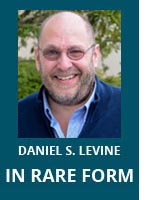 We all have our beliefs. Two things I’ve come to believe in are love and science.
We all have our beliefs. Two things I’ve come to believe in are love and science.
Having steeped myself in the world of rare diseases, it’s hard not to believe in these two forces. Every day is a testament to their power.
A few days ago, on one of my social media feeds a familiar face popped up. It was Bertrand Might, a child well known to the rare disease world. I clicked on it to learn Bertrand had died at the age of 12.
Bertrand was the first child to be diagnosed with NGLY1 deficiency, a complex neurodevelopment disorder. In 2014, the New Yorker recounted the story of Bertrand and his parents Matt Might and Cristina Cassanova, and what it’s like for a child with a condition that is new to science.
On October 24, Might posted to Twitter a black and white photograph of Bertrand’s empty room with a pillow in the shape of Captain America’s shield on the bed in color. “I’m struggling to find words,” wrote Might. “@bertrandmight passed last night. We are grateful for his 12 years with us — 10 more than predicted long ago. His courage, his strength, his kindness, his cheer and his pure heart will always make him our inspiration. Our hero.”
I’ve raised three kids to adulthood. I’ve patted myself on the back for chauffeuring them around, rooting for them from the sidelines, and for my part in managing to see them turn into functional adults, but I am always put to shame by the parents I meet in the rare disease world—not only Might, but the parade of others who have followed in his wake.
Bertrand and his father have lit the way for others to follow and provided a roadmap. People have followed Might’s use of erecting a beacon on the Internet for other patients with the same condition to find each other. New advocates have told me how they have reached out to him for guidance following the diagnosis of a child and how he has helped them understand what they need to do to build a patient community, and move down a path toward finding treatments.
Might, who is a computer scientist and director of the Hugh Kaul Personalized Medicine Institute at the University of Alabama Birmingham, built an artificial intelligence engine to scour medical literature to find potential connections among existing treatments for Bertrand. He found approved drugs and supplements this way that appeared to provide benefit for Bertrand. But he also took that work, which became the artificial intelligence system MediKanren, to do the same for other rare disease patients.
Bertrand had been developmentally stuck at around nine months for a long time, suffered hundreds of seizures per day, and was at risk of losing his vision because of a lack of tear production. Might found that N-acetylglucosamine, a simple sugar found in the shell of shellfish restored his son’s tear production. He found that the acid reflux medicine Prevacid, a proton-pump inhibitor, happened to be the right shape to hit a target in the brain that could address Bertrand’s seizures. It eliminated them. And he found that sulforaphane, a compound abundant in broccoli and available as a supplement, increases the activity of a related gene, and that doing so improved Bertrand’s cognitive abilities.
I’ve interviewed Might on several occasions and know his story, but I don’t know him well. I know Bertrand was a young boy with a severe illness. Nevertheless, it was a gut punch to learn of Bertrand’s death in ways I couldn’t explain. Perhaps when you see a force like Might and the way he brought both love and science together you believe it can fix any problem.
Bertrand’s death hurt, but it doesn’t shake my beliefs.
All I know is that two things we need now more than ever are love and science.
Photo: Bertrand and Matt Might

Stay Connected
Sign up for updates straight to your inbox.
